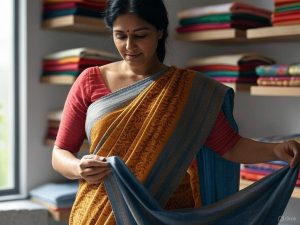The saree, a timeless symbol of Indian culture, has evolved into a canvas for sustainable fashion. With growing awareness about ethical consumption, learning how to build an ethical saree wardrobe on a budget is no longer a luxury—it’s a necessity. This guide will walk you through practical steps to curate a collection that blends tradition with responsibility, all while staying cost-effective.
Why Ethical Sarees Matter for Your Budget-Friendly Wardrobe
Before diving into how to build an ethical saree wardrobe on a budget, let’s address the why. The fashion industry’s environmental and social impact is staggering, but ethical sarees prioritise:
- Sustainable Materials: Organic cotton, hemp, or recycled fabrics.
- Fair Wages: Direct support for artisans and weavers.
- Low Environmental Impact: Natural dyes and zero-waste practices.
By mastering how to build an ethical saree wardrobe on a budget, you contribute to a greener planet and empower traditional craftsmanship.

Build an Ethical Saree Wardrobe on a Budget
Step 1: Define Your Style & Budget
The foundation of How to Build an Ethical Saree Wardrobe on a Budget lies in intentionality. Ask yourself:
- What occasions do I need sarees for? Prioritise versatile pieces.
- What’s my budget per saree? Handloom options from Elegant & Traditional Sarees Online in India start under ₹2,000.
Avoid impulse buys—focus on timeless designs that suit multiple events.
Step 2: Invest in Quality Over Quantity
A key pillar of How to Build an Ethical Saree Wardrobe on a Budget is prioritising durability. Opt for:
- Handloom Classics: Khadi, Tussar silk, or Kota Doria.
- Reinforced Stitching: Ensures sarees last decades.
Brands like Satyugi offer elegant & traditional sarees online in India that balance affordability with heirloom quality.
Step 3: Explore Secondhand & Vintage Markets
Thrifting is a cornerstone of How to Build an Ethical Saree Wardrobe on a Budget. Explore:
- Local Markets: For affordable pre-loved sarees.
- Online Resale Platforms: Sites like Popshop Live India or saree-specific Facebook groups.
Vintage finds often feature unique craftsmanship at budget-friendly prices.

how to Build an Saree Wardrobe on a Budget
Step 4: Support Ethical Brands & Artisan Clusters
When buying new, research brands aligned with How to Build an Ethical Saree Wardrobe on a Budget. For example:
- Satyugi: A hub for elegant & traditional sarees online in India, offering handwoven sarees under ₹3,000.
- Weaver Cooperatives: Direct purchases from clusters like Chanderi or Kanchipuram cut middlemen costs.
Step 5: DIY & Upcycle for Fresh Looks
Revamp existing sarees to align with How to Build an Ethical Saree Wardrobe on a Budget:
- Convert old sarees into dupattas, skirts, or cushion covers.
- Mix blouses to create new outfits without spending.
Step 6: Rent or Borrow for Special Occasions
Save money and closet space—rent designer sarees via platforms like Stage3 or borrow from friends. This aligns perfectly with How to Build an Ethical Saree Wardrobe on a Budget.
Step 7: Care Mindfully for Longevity
Extend your saree’s lifespan with:
- Gentle Washing: Handwash cottons; dry-clean silks.
- Natural Storage: Use cotton/muslin wraps instead of plastic.

Build an Saree Wardrobe on a Budget
Affordable Ethical Brands for Your Budget
- Satyugi: Discover Elegant & Traditional Sarees Online in India starting at ₹1,500.
- EthicWeaves: Budget-friendly organic cotton sarees.
- Handloom Haat: Direct-from-weaver pricing.
Final Thoughts: Embrace the Journey
How to Build an Ethical Saree Wardrobe on a Budget is about progress, not perfection. Start small, support artisans, and celebrate each sustainable choice. Explore Satyugi’s collection of elegant & traditional sarees online in India to begin your journey today!
FAQ
Q: Can I really build an ethical saree wardrobe on a budget?
A: Absolutely! Focus on thrifting, renting, and investing in affordable handloom brands like Satyugi.
Q: How often should I repeat wearing ethical sarees?
A: Frequent rotation reduces wear and tear. A 6–8 saree capsule wardrobe is ideal for budget-conscious buyers.


